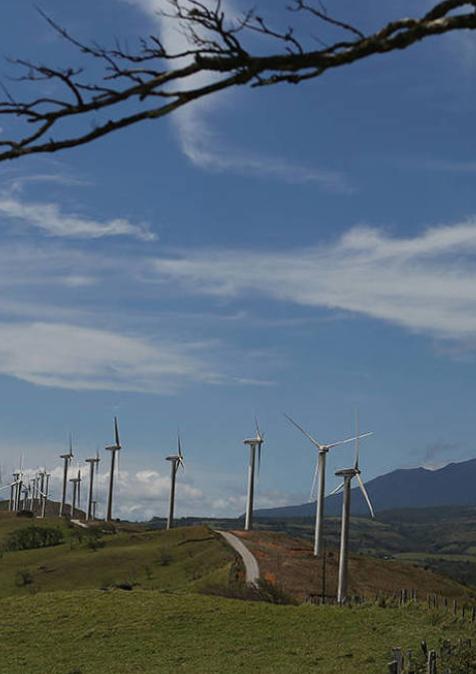Publications /
Opinion
This publication was originally published in Project Syndicate
WASHINGTON, DC – The world economy remains beset by challenges, from tight monetary, financial, and fiscal conditions to the effects of the war in Ukraine. These headwinds are impeding global growth – which is expected to slow to 3% this year, compared to 3.5% in 2022 – and damaging lives and livelihoods, with poverty and food insecurity on the rise, particularly in developing countries. In addressing the complex and overlapping challenges the world faces, Latin America and the Caribbean (LAC) is a region with much to offer.
For starters, LAC countries can help create a more resilient global food market. As early as 2017, the World Economic Forum facilitated a joint ministerial declaration calling for the region to become the “breadbasket of the world.” And at last year’s Summit of the Americas, hosted by the United States, participants released an Agriculture Producers Declaration underscoring the important role of major LAC exporters in strengthening global food security.
The reason is obvious. With one-quarter of the world’s arable land and one-third of its freshwater resources, LAC already comprises the largest net food exporter among world regions. What is needed now is new investment, especially in physical and digital infrastructure and in climate- resilient agriculture, continued technological and competitiveness improvements, and better integration into regional and global value chains.
Beyond food, the region is well-positioned to become a global climate leader. LAC countries account for less than 10% of global greenhouse-gas emissions, and are home to trailblazers in the quest for a green and just transition. For example, Costa Rica and Uruguay were among the first countries in the world to start generating nearly all domestic electricity from renewable sources. Even carbon-intensive economies, such as Colombia, are now undertaking ambitious reforms to mitigate climate change.
More important, with two-thirds of the world’s lithium reserves and 40% of its copper reserves – both essential to climate-friendly technologies – the region holds the key to curbing emissions everywhere and will play a major role in ensuring that these critical minerals are sourced and processed in environmentally and socially sustainable ways. This explains why these resources featured prominently in the recently announced €45 billion ($49 billion) European Union-LAC Global Gateway Investment Agenda.
LAC countries also have an important role to play when it comes to climate adaptation. With climate change already affecting vulnerable communities in the region, these countries are offering valuable insights into the dangers that lie ahead and into the virtues and limits of current adaptation strategies – and becoming increasingly influential in global discussions. Already, Barbados played a prominent role in the Paris Summit for a New Global Financing Pact in June. Moreover, Brazil will assume the G20 presidency at the end of this year, and host the United Nations climate summit (COP30) in 2025.
More broadly, LAC countries are experimenting with, and bringing into the mainstream, innovative instruments that link policy, climate, nature, and finance. The Caribbean Catastrophe
Risk Insurance Facility – created in 2007 as the world’s first multi-country, multi-peril risk pool – provides a financial buffer against increasingly frequent extreme weather.
Furthermore, in May, Ecuador completed the world’s largest-ever debt-for-nature swap, generating $323 million in savings to finance conservation projects. This followed Belize’s landmark 2021 debt-for-nature swap, widely hailed as a successful model for subsequent conversions.
Last year, Chile and Uruguay issued the world’s sovereign sustainability-linked bonds. Moreover, Colombia became the first country in the Western Hemisphere to adopt a national green taxonomy, a classification tool that enables lenders and borrowers to identify economic activities that contribute to environmental goals. This year, Mexico unveiled its own sustainable taxonomy, covering both environmental and social objectives.
LAC countries are bringing their experience to bear on other vital global policy discussions, too. Consider inflation, a frequent challenge in the region. Over the last two years, many LAC central banks hiked interest rates more quickly and aggressively than their advanced-economy counterparts. The policy appears to have paid off: the region, excluding Venezuela and Argentina, kept inflation below the OECD average in 2022 (though complacency must be avoided).
At the same time, the region is devising potentially transferrable approaches to international migration and displacement, which remain high worldwide as a result of humanitarian, economic, climate, or other factors. For example, the socioeconomic integration of Venezuelan migrants in host communities in Colombia and elsewhere makes for a useful case study.
Clearly, there is no shortage of areas where LAC countries can leverage their strengths to assert global leadership. But if the region is to seize the opportunities ahead, it must prepare itself better by accelerating development progress at home.
On the macro front, many LAC countries need to do more to advance and balance their growth, fiscal, and equity goals. Rigorous, evidence-based policymaking is urgently needed amid continued inflationary pressures and risk-off sentiment. On the micro front, productivity and labor-market improvements are essential to repair the damage caused by the COVID-19 pandemic and make the most of the region’s most valuable asset: human capital.
Sound public policy, strong institutional capacity, and more effective and efficient government programs will be vital to address these macro and micro challenges and ensure socioeconomic progress. Greater regional integration would also help, by supporting the protection and development of regional and global public goods. And collaboration with the private sector, civil society, multilateral organizations, and the international community will be indispensable.
Can the region meet its potential for global leadership? We certainly hope so. A more resilient, sustainable, and inclusive LAC can help build a world that is greener, more energy-secure, and better fed, while contributing solutions to the most pressing global policy and governance challenges. At this critical moment, what is good for Latin America and the Caribbean is good for the world.










